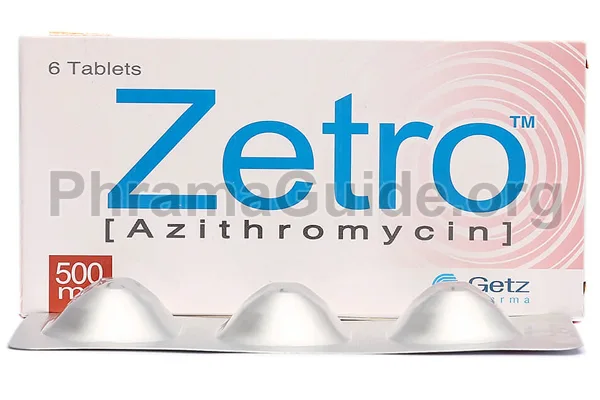Zetro tablet is primarily used to treat a variety of bacterial infections. It is an antibiotic medication that belongs to the class of drugs known as macrolides. Following are some common uses of Zetro Tablet:
1. skin infections
- Cellulitis
- Erysipelas
2. Respiratory Infections
- Bronchitis
- Pneumonia
- Sinusitis
3. Ear Infection
4. Gastrointestinal Tract Infections
- Traveler’s Diarrhea
5. Sexually Transmitted Diseases
- Chlamydia
- Gonorrhea
Off-label Uses of Zetro Tablet
- Acne: Zetro tablet may be used off-label to treat acne, especially in people who have not responded to other treatments.
- Rosacea: Zetro tablet may be used off-label to treat rosacea, a chronic skin condition that causes redness, pimples, and bumps on the face.
- Malaria prevention: Zetro tablet may be used off-label to prevent malaria in people who are traveling to areas with a high risk of malaria.
- Cystic fibrosis: Zetro tablet may be used off-label to treat cystic fibrosis, a genetic disorder that affects the lungs and digestive system.
- Bronchiectasis: Zetro tablet may be used off-label to treat bronchiectasis, a chronic lung condition that causes damage to the airways.

What is Zetro?
Zetro is one of the leading brands of Azithromycin, manufactured and marketed by Gtez Pharmaceuticals, Pakistan.
Zetro Alternatives : Other Similar Brands
Following are some alternative brands of Zetro and their manufacturers.
- Azitma : Sami Pharmaceuticals, Pakistan.
- Azomax : Novartis, Pakistan.
- Macrobac : Asian Continental Pharmaceuticals, Pakistan.
- Zyto : High-Q Pharmaceuticals (Pvt) Ltd, Pakistan.
- Azotek : Saffron Pharmaceuticals, Pakistan.
- Zezot : Bosch Pharmaceuticals, Pakistan.
- Zithromax : Pfizer Pharmaceuticals.
- Atizor : Macter International.
- Exthro : Indus Pharmaceuticals, Pakistan.
- Azitral : Nova Med Pharmaceuticals, Pakistan.
- Rescue : Standpharm Pakistan (Pvt) Ltd.
Zetro : Available Formulations and Strengths
Presently, Zetro is available in Tablets, Capsule, and Suspension forms
Zetro Tablets : 250mg, and 500mg strengths
Zetro Capsule : 250mg strength
Zetro Syrup : 200mg/5ml strength
Who Should Not Use Zetro?
The most common contraindication for Zetro is known as “cross-reactivity” or the potential for an allergic reaction between drugs in the same class. Zetro belongs to a class of antibiotics called macrolides, which also includes erythromycin, clarithromycin, and telithromycin. Therefore, patients who have had an allergic reaction or severe side effect from any of these medications should not take Zetro either.
Additionally, those with liver disease should not take Zetro because it can cause liver damage in some people when taken over long periods of time or at high doses.
Pregnant women should not use Zetro unless absolutely necessary because it has been linked to birth defects in rare cases when used during pregnancy. If a pregnant woman must take this medication she should first consult her doctor about the risks involved before doing so and monitor herself closely throughout treatment for any signs or symptoms that may indicate harm to her unborn baby such as nausea and vomiting, abdominal pain or cramps, fever/chills etc.
Certain medical conditions may also increase the risk associated with using Zetro contraindicated, such as HIV infection; heart rhythm disorders; kidney disease; electrolyte imbalances (e.g., low potassium); myasthenia gravis; porphyria; seizures; lupus; cirrhosis; asthma etc.
What is the Recommended Daily Dosage of Zetro?
ZETRO tablets and oral suspension can be used with or without food.
Zetro maximum daily dose for adults and children above 12 years, is 1500mg.
Adults Dose:
For all indications, the usual adult dose is 500mg as a single dose in 24 hours for 3 days
Sexually transmitted Disease: 1000mg/day as a single dose
Conjunctivitis and trachoma: 1000mg single dose or once weekly for up to 3 weeks
Treatment of community-acquired pneumonia: 500mg/day for 1 week.
Treatment of pelvic inflammatory disease: 250mg/day for 7 days
Children Dose:
Zetro dose in children is 10mg/kg of body weight in 24 hours for 3 days.
Conjunctivitis and trachoma: 20mg/kg of body weight once a week and therapy for three weeks.
Streptococcal pharyngitis and tonsillitis: 20mg/kg of the body weight in 24 hours and therapy for 3 days consecutively.
Acute Otitis Media: 10mg/kg of the body weight in 24 hours and therapy for 3 days
Acute Bacterial Sinusitis: 10mg/kg of body weight in 24 hours for 3 days.
Community-Acquired Pneumonia: 10mg/kg of body weight in 24 hours for 5 days.
How Zetro Works?
Zetro belongs to the macrolide family of antibiotics and works by preventing bacteria from making proteins that are essential for bacterial growth. Thus Zetro works by stopping bacteria from growing and allowing your body’s defense system (immune system) to work better against them.
Azithromycin (the active ingredient of Zetro) inhibits the process of protein synthesis in bacteria by binding to the 23s RNA of the bacteria 50s ribosomal subunits.
Related Links:

Leave A Comment